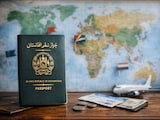The world was in the middle of a war, and the only way for soldiers or anyone on government duty to communicate with friends, family and lovers was through letters. Before he was deputed as a signalman near Tobruk, North Africa, Chris Barker worked with Bessie Moore in the London postal office. On September 5, 1943, Barker thought of writing to his friends and acquaintances, including Moore. And it was her response that changed things forever. What transpired next was a wartime romance in about 500 letters exchanged until 1946.
This treasure trove of letters written by Barker and Moore remained under wraps until their son Bernard came to appreciate it years later.
It all began when his father handed him a small box not long before his death in 2007. “It wasn't a very large box," Bernard said, adding, “But it had, in the end, 500 letters,” Bernard Barker told Newsweek.
The letters written at the time often mixed accounts of daily life with expressions of longing and hope.
Barker grew up in Holloway, north London, and found work at the Post Office during the 1930s. He first met Moore there; they became friends. Bernard said that their offices were divided by gender, but the clerks kept close social ties through union meetings and events. “My father knew my mother before the war, but I don't think there was any romance in the air,” he said.
Initially spared from military service because of his telegraph skills, Barker was eventually called up in 1942 and joined the Royal Corps of Signals in North Africa. From there, he began writing regularly, often to family and friends.
In his first letter, Barker wrote to Moore. “How are you getting on, old timer, you know, I'm out here and it's interesting in North Africa.” In her response, Moore told him that she was no longer with Nick, her boyfriend at the time.
Once Barker learned that her old friend was single, the tone of his letters shifted. “So, the letters quickly became love letters. But they were also kind of speculations on life,” Bernard said.
He continued writing, describing moments of celebration, such as being welcomed in Athens, but also fear, as communist partisans surrounded him and his unit came under fire. Captured and forced to march through the Greek mountains, the signalmen relied completely on Royal Air Force food drops.
"Can you feel, as you read these words, that I am thinking of you now; aglow, alive, alert at the thought that you are in the same world, and by some strange chance loving me," read one of the excerpts from the letters, according to the book titled My Dear Bessie: A Love Story in Letters.
Back in London, Moore grew increasingly anxious. The letters from that period, Bernard said, became “particularly poignant” as his mother worried for her old friend-turned-lover's safety; he worried about bombs falling on the capital.
During a period of leave, the couple decided to marry. The ceremony was modest, Bernard said. “They got married while the war was still going on in London, but they did it in a registry office and then had sandwiches in a pub, and then went off on their honeymoon.”
Soon after, Berker returned overseas, while Moore discovered she was pregnant with Bernard.
The letters eventually stopped as peacetime resumed. Barker returned to the post office, later rising to become head of the London Chief Office. He and Moore built a family life in London, raising two sons and later travelling across Europe during retirement.
Through 500 Letters, A Son Discovers His Parents' World War 2 Love Story
500 wartime letters reveal the story of Chris and Bessie Barker, whose words carried them from friendship to marriage during World War II.
Advertisement
Read Time:
4 mins
Representational Image
Featured Video Of The Day
Tipu Sultan Showdown: Tyrant Or Hero?
Topics mentioned in this article















